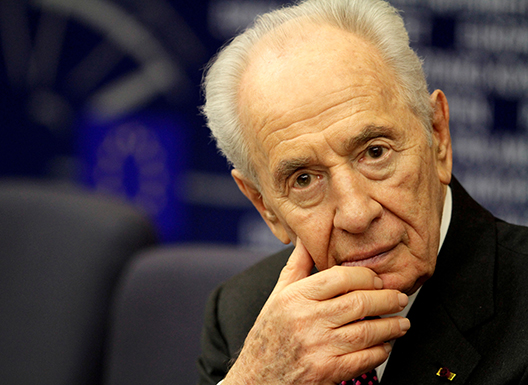 Although age and infirmity had already curtailed the impact of Shimon Peres on Israel and its neighbors, his passing nevertheless measures high on the Richter scale of Israeli and regional affairs. For decades he represented his country and its citizens with great skill and impressive finesse. Yet the polish and sophistication he projected masked underlying toughness and determination. Although the name Shimon Peres will always be associated with the Oslo process and with grand projects reflecting a broad and constructive vision for the future of the Middle East, his eye never wandered from task number one: the security of the Jewish State and its people.
Although age and infirmity had already curtailed the impact of Shimon Peres on Israel and its neighbors, his passing nevertheless measures high on the Richter scale of Israeli and regional affairs. For decades he represented his country and its citizens with great skill and impressive finesse. Yet the polish and sophistication he projected masked underlying toughness and determination. Although the name Shimon Peres will always be associated with the Oslo process and with grand projects reflecting a broad and constructive vision for the future of the Middle East, his eye never wandered from task number one: the security of the Jewish State and its people.
I came to appreciate the professionalism of Shimon Peres in early 2001, when I served in Jerusalem as chief of staff of the Sharm al-Sheikh Fact-Finding Committee. Months earlier, at a summit meeting held in Sharm al-Sheikh, Israeli Prime Minister Ehud Barak and PA President/PLO Chairman Yasser Arafat had agreed to a suggestion by President Bill Clinton that an inquiry be conducted into the ongoing Palestinian intifada: what had caused it, and what might be done to tamp-down violence, prevent its recurrence, and move forward politically in ways upholding the Oslo peace process. Former Senate Majority Leader George Mitchell was selected to lead a distinguished group of international statesmen charged with finding facts and making recommendations. I ended up heading the effort on the ground and drafting the committee’s report.
Prime Minister Barak’s government elected to minimize cooperation with the committee. On February 6, 2001, however, Barak was replaced by Ariel Sharon, who selected Peres as his Minister of Foreign Affairs. Thanks to the expert intervention of US Ambassador Martin Indyk, responsibility for working with the fact-finding committee was assigned to Peres, whose leadership and enthusiasm for the task at hand saved the day, enabling Mitchell and his colleagues to undertake a crucial visit and produce a report that, in retrospect, may have amounted to the last, best shot at a stable, sustainable two-state outcome.
Neither the Palestinian side nor the Israeli side implemented the recommendations of the April 2001 Sharm al-Sheikh Fact-Finding Report, although both sides welcomed the report as factual and fair. In some ways that outcome summed up the impact of Shimon Peres on Israeli-Palestinian peace. Procedurally, Peres was open to dialogue and innovation. Intellectually he was curious and creative. But he was not one to take risks with Israel’s security; he was no peacenik. Although it is quite possible that the two-state prospect would look better in 2016 than it actually does had Peres ever persuaded a majority of Israelis to back him electorally for a sustained period (or if Yitzhak Rabin had not been murdered), it is also possible that something like today’s stalemate would have prevailed even with Peres at the helm for a significant period. He never saw himself as the taker of huge risks. Those who had the mixed pleasure of negotiating with him discovered quickly they were dealing with no softy.
Indeed, Shimon Peres could be stubborn, didactic, and irascible. Some of his domestic political feuds and maneuverings are legendary. But he was a patriotic true believer and a consummate professional. Ideally his vision of a prosperous region at peace will be seized by those – in Israel and elsewhere – politically capable of bringing it about. In the end the legacy of this immensely talented, engaging, and inventive man will depend on the efforts of others who will either build upon his good works or abandon them entirely.
Frederic C. Hof is director of the Atlantic Council’s Rafik Hariri Center for the Middle East.
Image: Former Israeli president and prime minister Shimon Peres attends a press conference at the European Parliament in Strasbourg, France March 12, 2013. (Jean-Marc Loos/Reuters)
